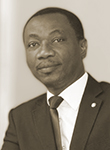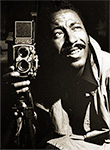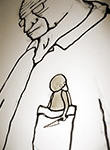This fall marks Blackbird’s fifteenth Levis Remembered, which calls attention to the work of Larry Levis and recognizes Rickey Laurentiis, winner of the nineteenth annual Levis Reading Prize.
Included in this year’s Reading Loop are: Levis’s “Poem Ending with a Hotel on Fire” and “Elegy with a Darkening Trapeze Inside It,” both of which come from his second posthumous poetry collection, The Darkening Trapeze: Last Poems; the audio of a 2016 AWP Conference & Bookfair panel discussion on the book, moderated by its editor, David St. John, and featuring commentary by poets Carolyn Forché, Linda Gregerson, and Mark Doty; a reproduced manuscript version of “Poem Ending with a Hotel on Fire”; and an extended review essay about The Darkening Trapeze by poet and essayist Matt Donovan. Also included is the trailer for Michele Poulos’s 2016 documentary film, A Late Style of Fire: Larry Levis, American Poet.
Four poems from Laurentiis’s prizewinning collection, Boy with Thorn, are presented alongside poet Keith S. Wilson’s review of the book, as well as audio from the Levis Reading Prize event, featuring a commemorative essay on Levis by Gregory Donovan.
A poet highly responsive and responsible to the intensities of witness and remembrance, Laurentiis also examines the witnessing self: “What is it / my mind wants to get at, always extending, hungering, looking / back, always tearing open again its own modernity,” and he asks, “it is a thorn?”
Laurentiis’s work fits as a tonal reflection of much of the issue’s other work, in which the writers seem particularly attuned to Dr. Williams’s charge: that we get the news from poetry or bear the consequences. Betty Adcock, for instance, reminds us that the least among us might not wear human faces at all. The dark news that she reports sings truth to the refusals of the mighty, that “the blind and unhearing will learn / water not by touch but by absence, / in a silence whose name is thirst.”
Choosing to report on the American experiment from the perspective of a witnessed past, Laura Da’s quartet of historical narratives follow Crescent—youngest son of a God-prostrated, failed farmer—from his birth on “rich land puckered / between the Salundy and Corn Creek,” through young manhood, into Ohio and the life of a surveyor on “the frontier’s flirting terminus.”
However, work by Ivorian poet Josué Guébo challenges us to reconsider our notions of exclusive nationality via the uncomplaining apostrophe of a speaker braving international waters, addressing the very waves that promise to save and/or destroy him. Meanwhile, he assures us, safe readers, that “There is much worse than a raft / adrift.” As translator Todd Fredson argues, Think of Lampedusa is not a poem of “escape or exile, but an inquiry into expanded belonging.”
Fatalism in a minor key rings out from Jenny Irish’s young poet who observes, “Unless we go by way of some slapstick accident, / the thing that will kill us is already inside us, / in all our bodies, built there, belonging where it nests.”
Rodney Jones explores another personal landscape to recall the denizens of his younger days, only to land back in “Cold Springs” where, the poet concedes, “the square has gone to shit. Tar paper on the hardware. Plywood on the depot. On the light pole in front of the closed movie theater the announcements for fire sales, revivals, and tractor pulls have formed a hard, white laminate of papier-mâché.”
Striking a more lyrical note of calm reflection enables Lena Khalaf Tuffaha to infuse her tale of childhood global journeys with a faint optimism, noting her youthful admission: “I move around // trailing my tribe in an orderly dance,” acquiring worldly wisdom enough to recognize how “Nowhere // is a homeland, too.”
Documenting a different sort of exile, Tobias Wray uses the textual formalities of drama, its parenthetical involutions of stage direction and overt dialogue tags, to baffle the barrage of full and slant rhymes along the right margin of his queer auto-da-fé. Doing so, he renders visible the deadly silences that persist among boys and men whose relationships (erotic or otherwise) suffer when “Everything” is “left this way, / as apogee, as hosanna.”
The chore of making sense of where we live for our children drives Robert Wrigley’s encyclopedic tribute to the state of Idaho. His poem faces, head-on, the tribulation that, as a political entity, the state“was established by the republic / it hardly seems to want to be a part of anymore.”
Similarly, G.C. Waldrep’s eerie, belated prescience might serve as another cautionary tale for what’s to come. Our predicament? To choose either “a god of flowers” or “a god of bones.” So much for old, fraught brotherhood, when “every day [is] an election / among the arteries, the veins.”
Essential bard of the fugitive life, David Wojahn offers a sampling of new poems whose historical elements pile up—quite democratically—over intimate lunch scenes and natural disasters alike. On the one hand he gives us a lush, late dirge for Claudia Emerson, celebrating the way her faith “Lay always in unsealing, in the gnosis we carry, / Luminous & mortal within.” On the other, he speaks as a modest Jeremiah: “ . . . O let me shut the book upon this all. The apocalypse is always personal, / which is one definition of art. // The apocalypse is never personal, which is another truth entirely.”
In Fiction, the married couple of Adam Latham’s story, “The Lizard Man,” mourn the tragic death of their young son and set out on a hungry pursuit of legendary cryptids in the American wilderness. In their desperate search, they discover only a haunting emptiness echoing back the memories of their child from a darkness where no light is promised.
Brimming with vitriol, Terese Svoboda’s narrator in “A Thankful Scenario” reports the nihilistic sorrow of her father during the holidays, while also questioning the role of the parent, the expectation of the child, and the looming awareness of death that truncates them both.
Gone AWOL during the war in Afghanistan, Courtney, the narrator of Jesse Goolsby’s “We Drag Our Feet near the Stingrays,” tries to find meaning in a life now devoid of structure and purpose, while the disparity between who we are and what we seem to be is the central focus of TJ Beitelman’s “Joy.” This disparity also echoes in Susan Thornton’s “A Visit from the Bishop,” a deceptively genteel evisceration of hypocrisy.
In Nonfiction, Darnell Arnoult’s essay, “When I Started to Cry,” attempts to understand “when the weeping started or why.” Similarly, Pamela Gerhardt presents a finely balanced account of personal griefs and collective tragedy in the just-post-September 11 world as she travels with her family in France, remembering how “people approached us as one might a person whose family member had died: ‘Je suis désolé,’ they would say. I am sorry.”
An evocative trio of flash prose pieces by Beth Ann Fennelly melds memoir and the matchless voice of a poet whose wit and wry humor combine with amazing grace. Summarizing herself, she warns: “Friends materializing by my side. Ripe fruit dangling overhead. Unpremeditated bliss. Is it clear to you now, at last, and forever? That’s the type of assistance I need.”
Also in Nonfiction, essays by Anna Journey and Randy Marshall excavate the archeological origins of the creative life, Journey in a dissection of the stories told by her own family and Marshall in a close reading of the poet T.R. Hummer.
Victoria C. Flanagan, Chelsea Gillenwater, Matthew Phipps, and Laura Van Prooyen review new books by Jordan Rice, Eliot Treichel, Paula Whyman, and Patty Paine.
In Gallery, David Caudle’s Likeness brings us to colonial Boston, where the Stamp Act has just been passed. A young, ambitious artist has been commissioned for a painting that will solidify the wealth of his employer if properly received, but the employer’s demands clash with his artistic integrity. As a victim of moral taxation, the young artist must decide whether to yield to the ordained representation, or forge his own.
George Ferrandi’s “Fugitive Materials,” based on a 2014 artist talk that covers much of her career as a visual and performance artist, includes more than 175 images and five videos. It culminates in an afterword about her 2015 work in Japan, and her current JUMP!STAR project celebrating the eventual change, in a thousand years, of the North Star. Also included is Ferrandi’s TEDxVCU Talk on her attempts, on the New York Subway, to sculpturally change “the shape of the space between strangers to the shape of the space between friends, or lovers.”
Eight photographs by noted photographer Gordon Parks taken between 1948 and 1967, and acquired by the Virginia Museum of Fine Arts between 2012 and 2016, are accompanied by curator Sarah Eckhardt’s commentary from a recent VMFA exhibit. The photographs appear here courtesy of the museum and The Gordon Parks Foundation. Some of these photographs were first published in photo essays by Parks in Life magazine.
Readings by David St. John, Anna Journey, and Dinty Moore complete the issue. ![]()
Return to top menus | Browse issue
















